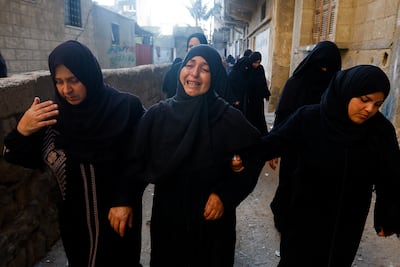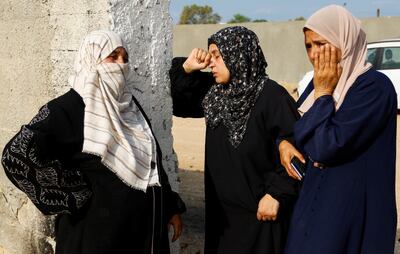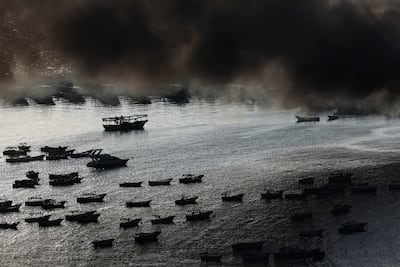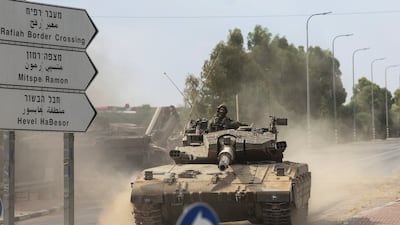Live updates: Follow the latest news on Israel-Gaza
Israeli air strikes and artillery shelling hit the area of the Rafah border crossing between Egypt and the Gaza Strip on Tuesday, disrupting operations at the only exit point on Gaza's southern border, Egyptian security officials said.
Egypt, meanwhile, has urged Israel to open humanitarian corridors for the strip's 2.3 million people to escape the bombardment, said to be the heaviest in the 75 years since Israel's conflict with the Palestinians began.
Israel on Monday announced a total blockade of the Gaza Strip.
The bombardments on Tuesday came a day after explosions close to the crossing on the Gaza side forced Egyptian authorities to suspend operations, according to the officials.
Three other crossings along Egypt's borders with the Gaza Strip and Israel have been closed for security reasons, said the officials.
Authorities have meanwhile stepped up patrols along Egypt's borders with Gaza and Israel to prevent any infiltrations by militants into Israel.
Troops deployed in the area have been placed on high alert and given permission to use deadly force against suspicious movements by anyone who approaches.
The disruption of traffic at the Rafah crossing and the closure of others comes as Israeli warplanes and artillery pummel Gaza in retaliation for Saturday's bloody incursion into southern Israel by militants from Gaza that left around 1,600 killed from both sides.

The surprise weekend attack has been recognised as Israel's bloodiest day since Egyptian and Syrian forces launched a surprise attack against the Israeli army 50 years ago.
Rafah is the only crossing point into Egypt's Sinai Peninsula for Gaza's residents. The rest of the Mediterranean strip is surrounded by Israel and the sea.
The officials said access to the Rafah crossing for registered travellers and humanitarian work had been restored by Tuesday morning.
Prior to Monday's closure, about 800 people left Gaza through the Rafah crossing and about 500 people entered, though the crossing was closed for the movement of goods, according to a report by Reuters.
The other crossings closed by Egyptians authorities along the border with Israel and Gaza are Taba on the northern tip of the Red Sea's Gulf of Aqaba which is mostly used by Israeli holidaymakers visiting the sandy beaches and pristine blue waters of resorts in southern Sinai, including Dahab and Sharm El Sheikh.
The others are the commercial border post of Karam Abu Salem, which lies where Gaza, Egypt and Israel meet, and Al Ouga, on the Egyptian-Israeli border.
The closures of the crossings followed a stern warning on Monday night from Egypt against what it called attempts to force Palestinians in the Gaza Strip into Sinai in a “mass movement” to escape the shelling and air strikes.

Quoting unnamed Egyptian sources, the statement “emphasised the danger of calls for mass population movement that will empty the [Gaza] Strip and liquidate the Palestinian issue itself. Moreover, Egyptian sovereignty is not fair game.”
Israel, it added, has a responsibility to find “humanitarian corridors” to save the people of Gaza.
President Abdel Fattah El Sisi appeared to allude to the danger of a mass exodus from the Gaza Strip and into Egypt when he spoke to the media in Cairo on Tuesday.
"There will be no lenience or squandering of Egypt's national security under any circumstances. The Egyptian people must be aware of the complexities of the situation and realise the magnitude of the threat," he said after attending a graduation ceremony for police officers.
"Egypt will not allow the liquidation of the Palestinian question at the expense of other parties."

On Tuesday, the Israeli military revised a recommendation by one of its spokesmen that Palestinians fleeing its air strikes in the Gaza Strip head to Egypt.
Briefing foreign reporters, Lieutenant Colonel Richard Hecht initially said he would advise Palestinian refugees to “get out” through the Rafah crossing on Gaza's southern border with Egypt. His office later issued a statement, saying: “Clarification: The Rafah crossing was open yesterday, but now it is closed.”
The Egyptian statement was issued hours before the comments made by Lt-Col Hect.
Egypt has in the past expressed alarm that Israel was considering resettling Gaza's Palestinians in the sparsely populated Sinai, and those of the West Bank in Jordan.
Egypt became the first Arab nation to sign a peace treaty with Israel in 1979. Four decades later, its relations with its neighbour were described as a “cold peace”.
However, that has changed in the past decade, with both countries now coordinating counterterrorism efforts and those against human trafficking into Israel.
Egypt has in the past mediated truces between Israel and Hamas, the last of which was in 2021. Egypt has also tirelessly championed the two-state solution for the Israeli-Palestinian conflict that would allow the creation of an independent Palestinian state on the Gaza Strip and the occupied West Bank.
"It is the path to realising real and sustained security for the Palestinian people," he said.
Its efforts to mediate a truce to end the current fighting are believed to be making little headway, with both sides seemingly unwilling to negotiate for now.


